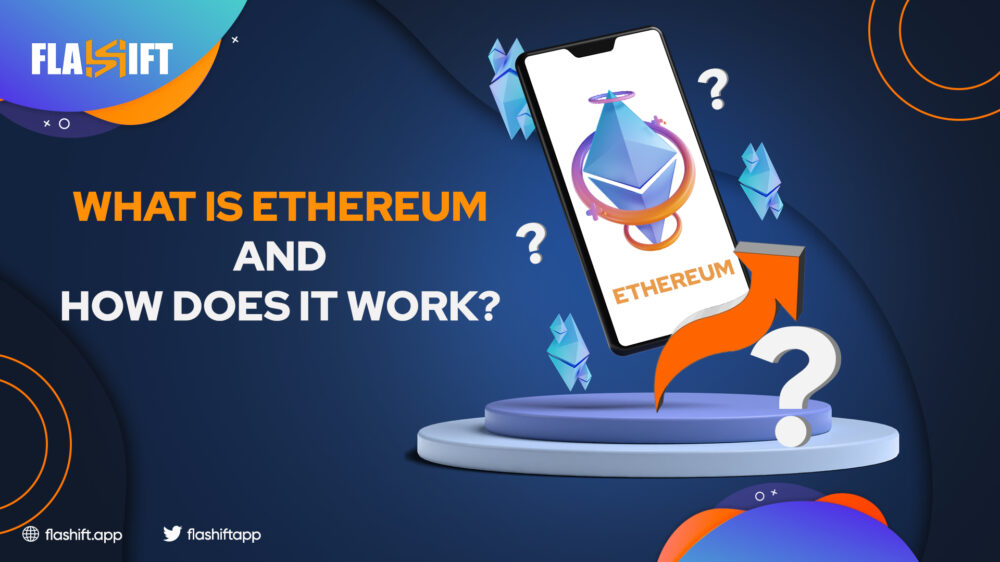What is Ethereum | Following Bitcoin, Ethereum (ETH) is the next most widely used digital currency. Established in 2015 by Vitalik Buterin and Gavin Wood, Ethereum’s valuation now accounts for around 20% of the $1.1 trillion worldwide digital currency market.
Ethereum is described as “a worldwide, decentralized system for money as well as new kinds of applications. ” Dozens of games and financial services operate on the Ethereum blockchain, which is so well-known that other cryptocurrencies use its network.
The blockchain system is crucial to Ethereum. A blockchain is a dispersed, decentralized open record where transactions can be confirmed and stored.
To exchange cryptocurrency at the best rate, visit the Flashift website, create a registration-free transaction, and enjoy a secure and speedy experience.
How does Ethereum function?
Like Bitcoin, the Ethereum system lives on many computers worldwide because people act as “nodes ” instead of a central server. As a result, the system is decentralized and highly resistant to assaults. It is incapable of going down as a consequence. There is no impact if one computer breaks down because hundreds of others keep the network functioning.

Ethereum is just one decentralized system operating the Ethereum Virtual Machine (EVM). Since each node has its copy of the system, every interaction must be validated for everyone’s copy to be upgraded.
To exchange Tether (USDTERC20) to Ethereum(ETH) at the best rate, visit Flashift.
Ethereum’s Evolution: The Merge and Beyond
One of the most significant milestones in Ethereum’s development was The Merge, completed on September 15, 2022. This upgrade transitioned Ethereum from a Proof-of-Work (PoW) to a Proof-of-Stake (PoS) consensus mechanism, reducing energy consumption by approximately 99.95% and significantly improving the network’s sustainability. The shift also enhanced Ethereum’s security and scalability, allowing validators—who stake their ETH—to participate in securing the blockchain instead of relying on energy-intensive mining. This transition set the stage for future upgrades to reduce transaction fees and increase network efficiency.
Institutional Adoption and Spot Ether ETFs
In July 2024, the U.S. Securities and Exchange Commission (SEC) approved the first spot Ether Exchange-Traded Funds (ETFs), marking a pivotal moment in Ethereum’s integration into traditional finance. These ETFs, listed on exchanges such as Nasdaq, Cboe BZX, and NYSE Arca, provide institutional and retail investors with regulated exposure to Ethereum without requiring direct asset custody. While these investment vehicles enhance Ethereum’s market accessibility, they do not support features such as staking, which remains exclusive to direct ETH holders. The approval of these ETFs signals a growing recognition of Ethereum’s role in the financial sector and its potential as a digital asset with long-term value.
Where are Ethers stored?
Ethereum customers save their Ether in wallets. A wallet is an online interface that allows you to access your Ether on the blockchain. Your wallet contains an address analogous to an email address because it is where users transfer Ether, just like an email address.
Your wallet does not contain any ether. When you begin an operation, you use your wallet’s private keys like a password. For every Ether you hold, you are given a private key. This key is required for ether access. You hear so much about safeguarding keys through various storage options.

Ethereum in Action: Real-World Use Cases
Beyond being a digital currency, Ethereum has transformed multiple industries by enabling decentralized applications (dApps). Here are some of its most impactful use cases:
- Decentralized Finance (DeFi): Ethereum powers platforms like Uniswap and Aave, which allow users to trade, lend, and borrow assets without relying on traditional banks. This has created a more open and accessible financial system.
- Non-Fungible Tokens (NFTs): Ethereum is the backbone of NFT marketplaces like OpenSea, enabling artists, musicians, and brands to tokenize digital assets and establish verified ownership.
- Enterprise Solutions: Major companies, including JPMorgan and Microsoft, utilize Ethereum’s blockchain for smart contracts, supply chain management, and secure data storage.
Ethereum’s Challenges & The Road Ahead
Despite its dominance, Ethereum faces challenges such as high transaction fees and scalability limitations. Competing blockchains like Solana and Avalanche offer faster and cheaper alternatives, attracting developers. However, Ethereum’s upcoming sharding upgrade aims to solve these issues by increasing transaction throughput and reducing costs.
As Ethereum continues to evolve, its impact on finance, digital ownership, and enterprise solutions solidifies its position as a revolutionary technology shaping the future of blockchain.
Ethereum Advantages
- The current network is extensive. Ether’s advantages include a tried-and-true system thoroughly tested through years of activity and trillions of dollars changing hands. It boasts the most significant ecosystems in blockchain and digital currencies and a vast and devoted worldwide society.
- A broad range of activities are available. In addition to being employed as a form of digital currency, Ether may also handle other kinds of financial transactions, perform innovative agreements, and maintain information for applications developed by third parties.
- Continuous development. A vast Ether developer community continuously seeks new methods to enhance the network and create new applications. Because of Ethereum’s recognition, it is the most commonly used blockchain technology for new and exciting decentralized applications.
- It avoids the need for middlemen. Ether’s distributed network promises to liberate users from third-party intermediaries such as attorneys who draft and interpret contracts, bankers who function as intermediaries in financial operations, and third-party site hosting providers.
Disadvantages of Ethereum
- Transaction expenses are growing. Ethereum’s increasing popularity has resulted in rising transaction prices. That’s excellent if you’re mining for cash but not so much if you’re trying to use the entire network. In contrast to Bitcoin, wherein the network pays transaction verifiers, Ethereum forces transaction participants to pay the cost.
- Crypto inflation is a possibility. Although Ethereum has a yearly limit of 18 million Ether, there is no lifelong restriction on the amount of currencies that may be created. As a result, Ether may behave more like a currency and might not appreciate to the same extent as Bitcoin, which has a tight lifespan restriction on the number of units.
- Developers have a steep knowledge curve. As developers transition from central processing to distributed systems, Ethereum might be challenging to learn.
Ethereum’s Prospects
The Ethereum blockchain has grown significantly recently, with developers using it to build decentralized financial projects, including NFTs. Proponents state that introducing new apps like these — among the first to function on a public blockchain — has already resulted in a tremendous network impact as increased activity draws more developers to Ether. However, fundamental questions remain, such as whether Ether, over the schedule with a complex set of technical upgrades, will be able to keep up with nimbler competitors and if any agreement on its long-term use will come about as the crypto world evolves.
FAQ
- What is Ethereum, and how is it different from Bitcoin?
Ethereum is a blockchain platform that supports smart contracts and decentralized applications (DApps). Unlike Bitcoin, which is mainly a digital currency, Ethereum is programmable, enabling various financial and enterprise use cases.
- What are smart contracts in Ethereum?
Smart contracts are self-executing contracts with rules written in code. They automatically trigger actions when conditions are met, removing the need for intermediaries.
- What is Ether (ETH), and how is it used?
ETH is Ethereum’s native cryptocurrency. It is used for transaction fees (gas), staking, and smart contracts. It is also an investment asset.
- What is Ethereum’s Proof-of-Stake (PoS) system?
Ethereum switched to PoS in 2022, replacing energy-intensive mining with a system where validators stake ETH to secure the network. This reduced energy use by 99.95%.
- How does Ethereum handle security and decentralization?
Ethereum is secured by a global network of nodes and validators, making it highly resistant to hacking and censorship while ensuring decentralization.
- What is the significance of Ethereum ETFs?
Ethereum spot ETFs, approved in 2024, let investors gain exposure to ETH via stock exchanges without directly holding the cryptocurrency.
- What is Ethereum’s future roadmap?
Upcoming upgrades like proto-dank sharding (EIP-4844) and sharding aim to reduce fees, improve scalability, and enhance network efficiency.






